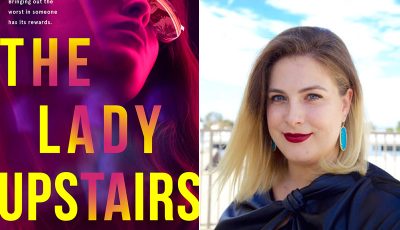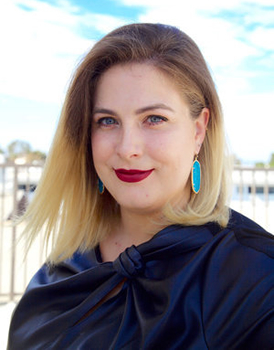

BookTrib Spotlight: Halley Sutton
A Stylish Noir, and a Woman You Do Not Want to Cross
“Maybe she wasn’t even a she at all. Except too many of the marks, the names funneled to Lou and me in white envelopes, were bad men—cheaters, assholes, men who never heard a no. They weren’t exclusively the men we targeted, but it was more than a passing coincidence. And I could understand why. Any woman could.”
In Halley Sutton’s delicious debut THE LADY UPSTAIRS, a woman we know only as Jo recruits and trains women to take down deserving marks for the boss she only knows as the Lady Upstairs. It feels righteous, but the danger signs are growing. She’s falling behind in the debt she owes the Lady, as well as the bribe money to the police. Her cameraman and occasional lover can’t be trusted. The woman who recruited her, Lou, sounds scared. There’s an annoying problem with the current mark, and there’s something about the next one that raises red flags.
And then it gets even worse. One of those marks ends up dead, which makes it entirely possible Jo could be next, because the Lady does not like loose ends: “What do you think, Jo,” says Lou, “the Lady sends us off with a tidy severance package when things ‘no longer work out?’…Do you think girls like us get to go live quietly after this…knowing what we know?”
Jo’s only hope is to pull off one last job without the Lady knowing about it, but that will require juggling an extraordinary number of balls in the air, and with so many secrets floating around—hers, Lou’s, the Lady’s—there may be one secret too many. And if just one ball drops….
Crackling with wit and style, THE LADY UPSTAIRS is as noir as they come, and compulsively, irresistibly readable—and it’ll take you places you’ll never guess. Think you know how it all turns out? You don’t.
“The idea for the book really started with Jo—I had her voice in my head very early—but didn’t have a framework or plot to put her in,” Sutton says. “It wasn’t until I decided to move to LA for grad school that I realized she was a perfect fit for a modern noir—and that I really wanted to make her a very literal femme fatale. It felt like the perfect marriage of her voice and a chance to interrogate some of my own issues with noir (a genre I love). Once I had that piece, the plot started to fall into place—that it would take place around women creating a business out of the role of the femme fatale.
“I did research in terms of a ‘noir’ voice, and by immersing myself deeply in LA’s criminal history. I think there are a lot of books out there that capture a more current, realistically vibrant LA (pretty much everything Steph Cha has written and Wendy Heard’s book The Kill Club come to mind), but I was really interested in LA-as-myth. So, trying to better understand both LA’s history, and then its own perceptions of itself as a city, as well as external perceptions of it as a city—all things I spent a lot of time reading about, thinking about.
“Raymond Chandler is kind of hard to get around, if you’re a novelist writing in the noir genre (or if you’re a novelist writing about LA, really). But just as big an influence, if not bigger, for me is Megan Abbott, whom I consider to be a perfect novelist. I also read a lot of James Cain, Dashiell Hammett, Dorothy B. Hughes, Lisa Lutz, Steph Cha, Sara Gran, Elmore Leonard, and so many more. I had the privilege of studying under Paul Vangelisti, a noir poet and renowned translator, while I was in grad school, and he exposed me to a lot of the international heavy-hitters, like Leonardo Padura, the Martin Beck series, Henning Mankell, and more…
“But I also watched a lot of noir films that influenced me. I cannot count the number of times I watched Body Heat or Gilda while writing this book—they both became sort of inspiration talismans for me, things I would turn to when I needed to get into a snappy noir writing rhythm. Other favorites: Jackie Brown, Out of Sight, Sunset Boulevard, and of course, Double Indemnity.
“I also went on a fair amount of noir/crime bus tours here in LA to better understand LA necessarily, but the mythmaking that surrounds the city. An endlessly fascinating subject to me.
“But I also did some research on businesses that might be at all like the blackmail/honeypot operation the Lady runs, and I found some interesting items. There are of course the women immortalized in the film Hustlers who would seduce/drug men into forking over a significant chunk of change at strip clubs. But I also found this really fascinating business based out of China, where women hire ‘mistress dissuaders’ to convince their husbands’ mistresses to leave their husbands alone—either by finding them a new boyfriend, or paying them off, or finding a distraction. There’s another book in there somewhere!”
There might also be another book in Sutton’s own childhood. She writes cryptically that she used to travel a lot with her parents, and while traveling, “I used to write letters to my favorite characters in books because I wanted them to know about my life the way that I knew about theirs.
“Haha! Little Halley was such a wonderful weirdo. I think I was about seven or eight years old (although it is possible I was a little older than that) and I remember my most frequent pen pal was Sally Lockhart from Philip Pullman’s The Ruby in the Smoke series. She was this empowered, can-do feminist-ish heroine who did a lot of exploring and investigated a variety of mysteries. I seem to recall updating her on the state of feminism circa 1995, as seen by a very young girl.
“I do not think any of the letters were ever sent. Let’s stick with that answer.”
As for the writing itself: “I have two tricks I use. So much of THE LADY UPSTAIRS is about Jo’s voice and being inside her perspective—I found it really helpful to read the book aloud, acting as Jo. I took on a slightly different voice, and pretended an Academy Award was on the line. It gave me better insight into her psyche—making me ask myself questions like: Wouldn’t she be thinking about this right now, or is she consciously avoiding trying to remember X…? I probably read the whole book aloud three or four times total.
“But I also use a trick I snagged from Ray Bradbury to come up with images, which is to start listing nouns. Just make big lists of nouns. Bradbury used it as a free-writing experiment to generate material for short stories, but I would start to do it for scenes or settings—list everything I could think of attached to that moment or place and start to cull the most interesting/distinctive items from the list to incorporate as images in a scene. When I had something that felt really vivid, it would help me work my way into a scene.”
She also got help from an outside source. Pitch Wars is an online mentoring program, in which authors and editors take one writer each for months of intensive work, and then the result is submitted to a grand agent showcase—last year, nearly 60 agents participated.
“Honestly, I think a lot of my being published had to do with my experience in Pitch Wars. Early on, I had Jo’s voice and lots of elements of the book—but Layne Fargo (author of Temper and my Pitch Wars mentor) showed me how to put a plot together using the Save the Cat! Writes a Novel framework. She really changed my perception of how to build a story and showed me how to better utilize some of the things that I was unconsciously doing with the manuscript to hit harder.
“It was an invaluable resource to have her guiding hand on my manuscript, and I knew that I wanted to be a part of it myself as a mentor, if possible—to give back from an experience that was so wonderful for me. This year, Layne and I co-mentored a manuscript together, a lush, dark crime novel by a woman named Heather Lynn Levy—watch for her book!
“I first started submitting to agents before I got into Pitch Wars. I had a few requests for fulls, but also a lot of rejection—the most thoughtful, helpful of which came from Sharon Pelletier at Dystel, Goderich & Bourret. Sharon didn’t offer representation then, but she did offer a lot of feedback and a lot of positive commentary too—it was such a lifeline in the querying trenches where you often don’t hear much more than, ‘Not right for me.’
“After that, it was pretty clear that I needed to do some significant reworking of the novel, but wasn’t sure exactly how to go about doing it. Enter: Pitch Wars. Layne and I spent four months revising the manuscript, and then we entered the first page and a pitch in the agent showcase, where I was lucky enough to pick up some interest, including from Sharon on the revised manuscript!
“I was thrilled to sign with Sharon in February 2019. We spent a few months revising (if you had told me in 2018 how much revising was still ahead of me, I would not have believed you) before we put the book out on submission. Two weeks later, we had a pre-empt offer from Putnam, which was an unbelievable dream come true.
“After the book deal, Danielle (my editor) and I spent a few more months revising. Danielle helped me make the manuscript its strongest self and helped make my dreams come true—I love working with her.”
After all that work, the result is indeed spectacular, and it’s garnered a great deal of buzz. However, Sutton knows she can’t just stop there: “I’m actually still working on developing what the next project will be. I think I’ll be sticking in the feminist noir realm for a while, though!”
*****
Neil Nyren retired at the end of 2017 as the executive VP, associate publisher and editor in chief of G. P. Putnam’s Sons. He is the winner of the 2017 Ellery Queen Award from the Mystery Writers of America. Among his authors of crime and suspense were Clive Cussler, Ken Follett, C. J. Box, John Sandford, Robert Crais, Jack Higgins, W. E. B. Griffin, Frederick Forsyth, Randy Wayne White, Alex Berenson, Ace Atkins, and Carol O’Connell. He also worked with such writers as Tom Clancy, Patricia Cornwell, Daniel Silva, Martha Grimes, Ed McBain, Carl Hiaasen, and Jonathan Kellerman.
He is currently writing a monthly publishing column for the MWA newsletter The Third Degree, as well as a regular ITW-sponsored series on debut thriller authors for BookTrib.com, and is an editor at large for CrimeReads.
This column originally ran on Booktrib, where writers and readers meet:
- Africa Scene: Iris Mwanza by Michael Sears - December 16, 2024
- Late Checkout by Alan Orloff (VIDEO) - December 11, 2024
- Jack Stewart with Millie Naylor Hast (VIDEO) - December 11, 2024




